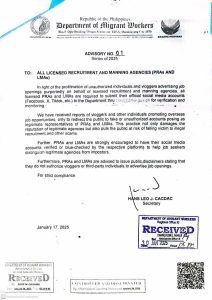New Zealand has few jobs, Filipino nurses told
By Javier Joe Ismael
September 29, 2024
(UPDATES)THE Philippine Embassy in Wellington has advised all Filipino nurses looking for jobs in New Zealand to exercise great caution before traveling to the country because there is a lack of employment opportunities for foreign nurses in the country.
The Department of Foreign Affairs (DFA) on Friday said that the embassy had reported that certain individuals and agencies offer to facilitate the hiring of foreign nurses by arranging for them to travel to New Zealand on a visitor visa to take the Comprehensive Assessment Program (CAP) or Objective Structured Clinical Examination (OSCE) for nurses and subsequently apply for registration by the Nursing Council of New Zealand (NCNZ)
The embassy said that while taking the CAP or OSCE and being registered by the NCNZ is a legitimate means for foreign nurses or Internationally Qualified Nurses (IQNs) to be able to practice nursing in New Zealand, it is not a guarantee of employment.
The employment of IQNs in New Zealand is dependent on various factors outside the CAP, OSCE and NCNZ, including local demand and the ability of employers in the New Zealand Health Sector to hire IQNs.
The embassy has received information that, due to the current lack of employment opportunities, IQNs who came to New Zealand on visitor visas have no option but to leave the country upon the expiry of their visas.
The embassy encouraged Filipino nurses to ensure that there is ready employment for them before leaving the Philippines, which includes obtaining a legitimate job offer with a verified contract from an accredited employer and a proper working visa issued by Immigration New Zealand.
Read More
Hungary-bound OFWs urged to honor job contracts
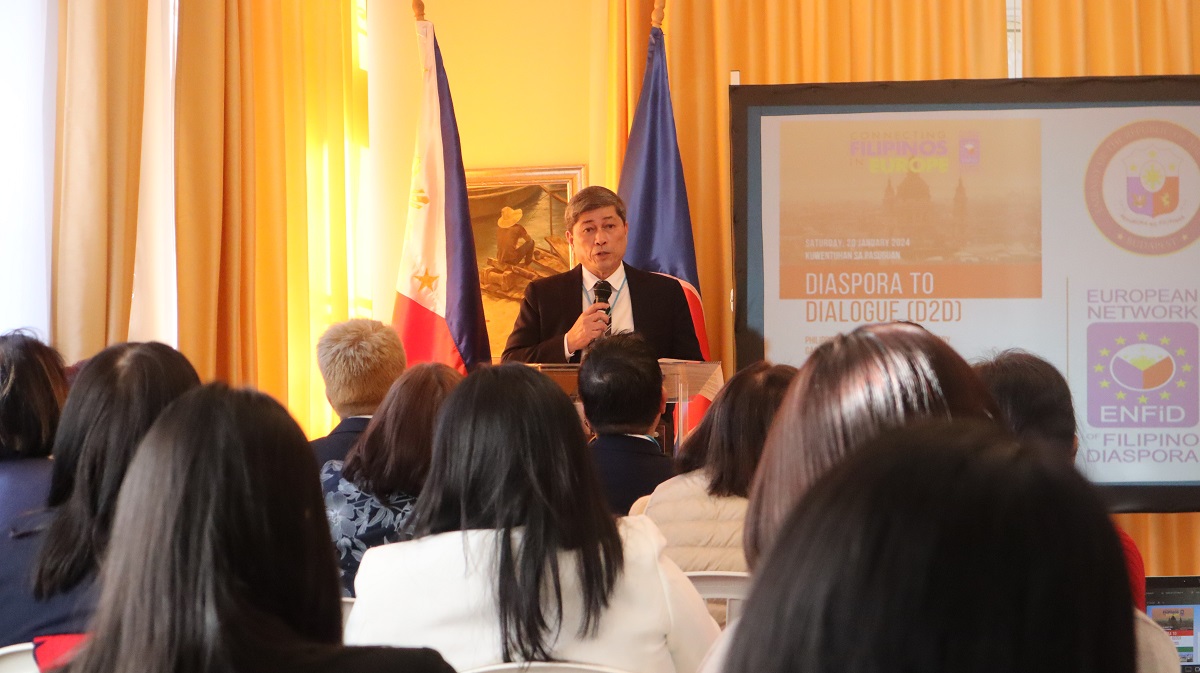
January 22, 2024 9:27am
BUDAPEST, Hungary – As more Filipinos look for work opportunities in Hungary, senior Filipino diplomats remind them to honor job contracts to avoid labor issues.
Philippine Ambassador to Hungary Frank R. Cimafranca said many Filipino workers coming to Hungary are considered “guest workers” under a newer and stricter immigration law.
“Guest workers” refer to third-country nationals without higher education and are given an initial two-year residence permit for the purpose of employment, which can be extended for one more year. Meanwhile, “highly qualified workers” are third-country nationals with a higher education degree and are entitled to a residence permit allowing them to stay in Hungary for up to three years.
“[For Filipino workers], the possibility of getting a permanent residency [in Hungary] is slim,” Cimafranca said on the sidelines of the Diaspora2Dialogue gathering organized by the European Network of Filipino Diaspora (ENFiD) on January 20 here.
Read More
Qatar-bound Filipino workers need not pay placement fees —DMW
By GMA Integrated News
Published September 1, 2024 10:56am
The Department of Migrant Workers said Filipinos intending to work in Qatar should not be charged placement fees.
This is in accordance with Article 33 of Qatar Law No. 14 of 2004, the DMW said.
Qatar Law prohibits licensed recruitment agencies from collecting payment for recruitment fees, expenses, or other associated costs from workers coming from abroad.
“The Department of Migrant Workers informs the public that the State of Qatar is considered as a non-placement fee labor-receiving country,” DMW Secretary Hans Leo Cacdac said in an advisory shared on the department’s Facebook page on Saturday.
Those who violate the no placement fee policy will face a penalty of cancellation of license, the DMW said.
Read More
PH enhances labor ties with Croatia for welfare, rights of OFWs
By Marita Moaje
October 12, 2024, 10:18 am
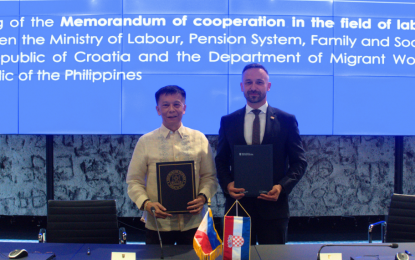
MANILA – The Philippine government, through the Department of Migrant Workers (DMW), has inked a memorandum of cooperation (MOC) with the Republic of Croatia for continued collaboration to ensure the protection and welfare of Filipino workers abroad.
In a press briefing on Friday, Migrant Workers Secretary Hans Leo Cacdac said the bilateral agreement also reaffirmed the two nations’ commitment to foster a relationship that upholds the rights and duties of Filipino workers in Croatia, while respecting both countries’ interests and laws.
Cacdac noted that the partnership between the Philippines and Croatia lays the groundwork for continued dialogue, collaboration, and mutual success.
“Filipino workers are globally recognized for their exemplary skills, dedication, and compassion, making them among the most sought-after workers worldwide,” he said.
DMW Undersecretary for Policy and International Cooperation Patricia Yvone Caunan said Cacdac signed the MOU on the Field of Labor Market with Croatia Minister of Labor, Pension System, Family and Social Policy Marin Piletić.
Caunan said the agreement would enhance employment opportunities for Filipino jobseekers in various industries in Croatia, including manufacturing, hospitality, and tourism.
It would also ensure that Filipino workers are legally protected and have access to mandatory health insurance and pension coverage, she said, adding that it would enable the two ministries to share their best practices.
Caunan noted that initial discussions between the Philippines and Croatia included plans to pilot a special hiring program for Filipino caregivers under a government-to-government framework.
“Ang sabi nila (they said) they will be opening 18 senior care facilities and they hope to have Filipino caregivers. But again, as I announced, their aim or the intention of our counterpart is that it goes through a government-to-government framework, so if there are 18 senior care facilities, siguro (maybe) between 500 to 1,000 in demand,” she said.
Read More
Runaway OFW caregivers in S. Korea arrested in Busan
By Marita Moaje
October 7, 2024, 11:44 pm
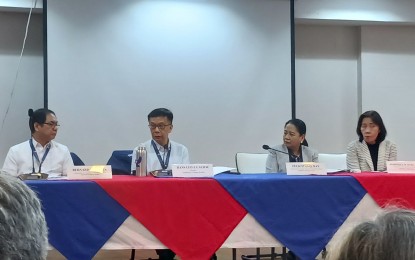
MANILA – The two overseas Filipino workers (OFWs) who were deployed to South Korea as caregivers under the Pilot Foreign Caregiver government-to-government hiring program, but failed to return to work after a holiday break, have been arrested.
Department of Migrant Workers (DMW) Secretary Hans Leo Cacdac said in a press briefing on Monday that they are waiting for the result of the investigation.
“Last October 4, they were found by the Special Investigation Team of Korean Immigration and they were arrested in Busan and are now being investigated,” Cacdac said.
The caregivers were among the 100 deployed to South Korea in August under the Employment Permit System pilot project that provides caregiving assistance to Korean households with young children, expectant mothers, single parents or working couples.
Cacdac said the first batch arrived in South Korea on Aug. 6.
They had a three-week specialized training and orientation seminar upon arrival, which ended on the first week of September.
The two caregivers left their quarters on Sept. 15, the second day of the five-day Chuseok (Korean Thanksgiving) holiday, but did not return to work on Sept. 18 and went off the grid.
Cacdac assured the two OFWs are still being assisted by the Philippine government.
“We are providing legal assistance to them to secure the best possible defense for them and make sure that they are not under duress or under any form of pressure in the course of the investigation, that they are adequately advised by legal counsel during the investigation,” he said.
Read More
2 Filipino caregivers likely to be barred from reentry after unauthorized absence
Violators of immigration law will be deported soon: justice ministry
By Jung Min-ho
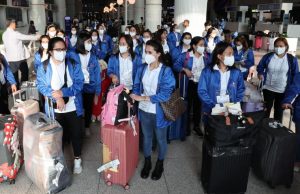
Two Filipino domestic workers who left their workplaces without permission last month will soon be deported and may be banned from entering Korea again, according to the Ministry of Justice.
In a recent response to inquiries from The Korea Times about the workers, who arrived in Seoul with 98 others in August to participate in the city government’s pilot program to introduce foreign care workers, the ministry said the two will be sent back to the Philippines for violating Korea’s Immigration Control Law.
The two had been out of contact after leaving their accommodation in mid-September and were caught in Busan about three weeks later.
“The two are now subject to deportation orders for violating section 43 of the law. They are expected to be deported as soon as the process is completed,” a ministry representative said. “Also, whether they should be on the list of people barred from entering the country is currently under review. In principle, those who are deported are restricted from obtaining a Certificate for Confirmation of Visa Issuance.”
Read More
DMW warns against cross-country recruitment schemes targeting OFWs
DMW warns against cross-country recruitment schemes targeting OFWs
The Department of Migrant Workers (DMW) has issued a renewed warning to the public regarding the rising incidents of “cross-country” or “third-country” recruitment schemes online that are targeting overseas Filipino workers (OFWs).
This warning comes after the DMW received reports about a possible case of human trafficking involving Filipinos who were tricked into forced criminal activities, such as working in online scam operations.
The report mentioned that several Filipinos, who had been recruited in Dubai, were allegedly sent to Nigeria and other countries in West Africa for illegal work.
“Pinaalalahanan ng DMW ang publiko na maging matalino at huwag magpapaloko sa mga pekeng recruiter upang hindi mabiktima ng illegal recruitment, human trafficking, at online scams,” the DMW said.
Read More
DMW Advisory
Reintroduction of Border Controls in the Schengen Area.
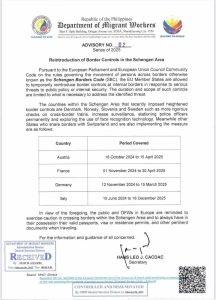
DMW Advisory
Reporting of social media accounts being used in manpower pooling/recruitment ads to DMW.
